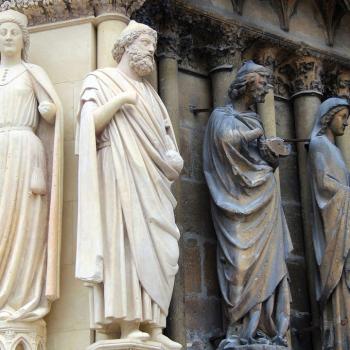I think part of the reason Glenn Beck's 912 Project opts for the term "values" rather than "virtues" is because virtues take work. They require practice to acquire as habits.
This is not what the 912 Project is for. It is not a group or "movement" of people who have chosen to practice these 12 virtues in order to acquire them as habits. It is not a group that seeks to learn or to embody those virtues at all.
Look at that list again: Honesty, reverence, hope, thrift, humility, charity, sincerity, moderation, hard work, courage, personal responsibility, gratitude.
Does any of that characterize the agenda or the practice or the visible habit of Beck's tea partying mobs? Were any of these virtues on display in the town-hall disruptions, in the angry marches or the signs carried under Beck's "912" banner? Was there even a hint that these gatherings were composed of people even slightly interested in such virtues?
This is why Beck's list of "12 values" can't withstand comparison to the first similar-seeming list that comes to mind, the Boy Scout Law. The Boy Scouts of America isn't my favorite organization as I'm not a
fan of either homophobia nor vacuous civil religion, but I am a big fan
of that Scout Law:
A Scout is: Trustworthy, loyal, helpful, friendly, courteous, kind, obedient, cheerful, thrifty, brave, clean and reverent.
Against such there is no law.
The 12 virtues listed there are at first glance quite similar to Beck's, but the differences are telling. The Scout Law begins "A Scout is" — these are not just external ideas to be "valued," they are aspects of what a Scout is to become, to be. That's the difference between values, to which one can pay cheap lip service, and virtues, which require practice, practice, practice until they are ingrained as habit and character and identity.
The Scouts' list is far more directed toward action — action centered around helping others, around relationship. Here is another distinction between the cheapness of values and the costly commitment of virtues — virtues must be practiced in relationship. The Scout Law requires them to be out in the community and in the world doing things — helping the proverbial little old lady across the street — and thereby becoming things. But Beck's list doesn't require any such movement or action on behalf of his followers. All his list requires is that one sit around thinking of oneself as a person who values those values and who is, therefore, better than other people who presumably don't because they haven't joined the club.
And that, I think, is the primary point of Beck's list of "values" for him and for his followers. It's not about becoming virtuous people who practice these habits and come to embody them as character. It's about the pretense that asserting them means possessing them in greater measure than the Others, in whom such values are presumed to be absent.
Beck's list of 12 Values, in other words, is an accusation.
The accused — Obama voters, "progressives," "social justice" believers, feminists, environmentalists, CNN viewers, newspaper readers, intellectuals, non-whites, etc. — are said not to care about these bedrock values the way Beck and his followers claim to.
This accusation is, again, a kind of bearing false witness. And like all such bearing of false witness, it begins to look shaky when this testimony is compared with reality. Upon examination those infidel Others, the accused, do not seem to fit the vile caricature of Beck's portrayal of them. Many of them, in fact, seem honest, reverent, hopeful, thrifty, humble, charitable, sincere, moderate, hard-working, courageous, responsible and grateful.
Sustainably portraying them as otherwise, therefore, requires withdrawing from reality in at least two ways. First it requires refusing to deal with these Others as they actually are, opting instead for the strawman and the demonizing caricature. This is harder than it might seem at first as it means there's a whole universe that one mustn't look at — a wide world which one must pretend to oneself that one didn't see after inevitably catching repeated glimpses of it throughout the day.
Sustaining feigned indignation in the face of inoffensive reality always takes a lot of work. That work is much like the work and practice of acquiring virtue, except it's working in the opposite direction.
The second way in which belief in this accusatory list requires one to withdraw from reality has to do with the list itself and with the meaning of the words therein. The meaning of words are also part of reality and so they too must be brought under the governing pretense of the false witness. Words are "in on it" too. So the pretense of this accusatory list is sustained, in part, by redefining words.
I hinted at some of those redefinitions in the previous post, but let's do more than that for a couple of these values: Charity and personal responsibility.
What does Glenn Beck mean by "charity"? He means "charity" instead of justice. Charity as opposed to justice. He means charity as a strictly voluntary, optional, extravagant (in nature, if not in scope) act.* He means he owes nothing to the needy, that the rich man owes nothing to Lazarus at the gate.
This is a redefinition of charity that was invented expressly for the purpose of defending a lack of charity. It is "charity" that proclaims the right not to share, not to give, not to be affected at all by the need of others. It is a denial of obligation, a denial of connection and of interconnection, a denial of kinship. It is the charity of Cain, rejecting any obligation to be one's brother's keeper.
That same insistence — we are not our brother's keeper — is also at the heart of what Beck means by the term "personal responsibility." For the 912 Project this does not mean that you must take responsibility for your choices and actions, not blaming others for your misfortunes. It means, rather, that you are responsible only for yourself and that you are free of any and all responsibility for anyone else. For Beck, in other words, "personal responsibility" is a declaration of irresponsibility.
This idea combines with the stunted anti-justice redefinition of charity to rationalize the refusal to assist others as a humane "do not feed the bears" policy. Which makes sense if you think of the world as an uncivilized jungle. And if you think of people in need as subhuman beasts.
"If you quit giving people that stuff, they would figure out how to do it on their own," one of Beck's 912 disciples said to The New York Times' Kate Zernike.** That man collects unemployment and Social Security, but spends most of his free time angrily making sure no one else can.
That's personal responsibility, Glenn Beck style. It means, "I got mine, you're on your own."
– – – – – – – – – – – – –
* For a fuller exposition of this duty-free meaning of "charity" — of charity as the opposite of justice — see Marvin Olasky's infamous book The Tragedy of American Compassion.
Olasky offers a mendaciously selective revision of 19th- and early 20th-century evangelical charitable movements in America. He portrays these groups as focused exclusively on a tough-love approach — requiring work as a prerequisite for any assistance. And he suggests that these charitable groups were therefore opposed to any form of public assistance or safety net, which he says they believed would have undermined their effective tough love. He argues that these charities were ultimately destroyed by the New Deal (which I guess is why the Salvation Army closed up shop in 1932, never to be seen again).
Olasky thus presents the odd notion that FDR invented and created American poverty — that America's poor were fewer in number and less desperate before the safety nets of the New Deal were put in place. That thesis falls apart when one looks at the facts of the matter. It isn't hard to find the statistics on the extent and degree of 19th-century poverty in America and to compare that to the extent and degree of late 20th-century poverty and realize that Olasky's whole argument is nonsense.
But the larger problem with Olasky's Tragedy is that it commits horrible abuses against its source material. A handy resource illustrating this point is Norris Magnuson's Salvation in the Slums: Evangelical Social Work 1865-1920. Magnuson relies on the exact same source material as Olasky, but he presents it unredacted, providing a revealing glimpse of just what Olasky skipped over in his selective reading. Many of those charities Olasky hails as champions of tough love in a Social Darwinist jungle were, in fact, calling for greater public support and exactly the sort of safety nets Olasky claims they oppose
d. And as much as I might disa
gree with his thesis and argument, my opposition pales in comparison to what the people he selectively cites actually said about people like him.
Many of the supposedly anti-government charities Olasky commends were actually deeply involved in the pre-Rauschenbusch social gospel movement, which in the late 19th-century preferred the term "Christian socialism." That phrase is, of course, the bogeyman Glenn Beck invokes in his rants against "social justice" churches that he sees as the enemies of charity and personal responsibility. But those 19th-century Christian socialists can't be so easily dismissed — without them, we wouldn't have the Pledge of Allegiance or WWJD? bracelets.
** Zernike also covered the "Tea Party Woodstock" yesterday in Searchlight, Nev., where former Alaska Gov. Sarah Palin was the headliner. That rally drew about 9,000 people. That's about 3/4 the size of the crowd at a New Jersey Nets home game this season. The Nets are 9-64. Just sayin'.
















